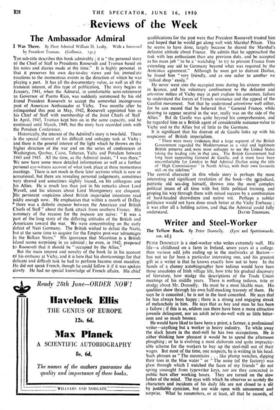Reviews of the Week
The Ambassador Admiral
I Was There. By Fleet Admiral William D. Leahy. With a foreword by President Truman. (Gollancz. zss.)
bI'RE sub-title describes this book admirably ; it is " the personal story of the Chief of Staff to Presidents Roosevelt and Truman based on his notes and diaries made at the time." It is highly personal, in that it preserves his own day-to-day views and his immediate reactions to the momentous events in the direction of whicn he was playing a part. It has all the documentary value, as well as all the transient interest, of this type of publication. The story begins in January, 1941, when the Admiral, in comfortable semi-retirement as Governor of Puerto Rico, was suddenly summoned by his old friend President Roosevelt to accept the somewhat incongruous post of American Ambassador at Vichy. Two months after he relinquished this post in May, 1942, Roosevelt appointed him as his Chief of Staff with membership of the Joint Chiefs of Staff In April, 1945, Truman kept him on in the same capacity, and he continued until March, 1949, but the story here recorded ends with the Potsdam Conference.
- Historically, the interest of the Admiral's story is two-fold. There is the special interest of his difficult and unhappy task at Vichy ; and there is the general interest of the light which he throws on the higher direction of the war and on the series of conferences at Washington, Quebec, Cairo, Teheran; Yalta and Potsdam between 1943 and 1945. All the time, as the Admiral insists, " T was there." We now have some more detailed information as well as a further personal eye-witness account of what took place at these momentous meetings. There is not much in these later sections which is new or sensational, but there are revealing personal judgements, sometimes +very shrewd and sometimes slightly biased, on his colleagues- and his Allies. He is much less than just in his remarks about Lord Wavell, and his silences about Lord Montgomery are eloquent. Iis persistent suspicions about British imperialist intentions read oddly enough now. He emphasises that within a month of D-Day there was a definite impasse between the American and British Chiefs of Staff " about the flank attack from southern France. His summary of the reasons for the impasse are naive: "It was a 'part of the long story of the differing attitudes of the British and 'Americans toward the war. We were concentrating on the early 'defeat of Nazi Germany. The British wished to defeat the Nazis, but at the same time to acquire for the Empire post-war advantages in the Balkan States." His ignorance that Mauritius is a British island seems surprising in an admiral ; he even, in 1942, proposed to Roosevelt that it should be " occupied by the Allies."
But the main interest and novelty of the book lie in his account of his embassy at Vichy, and it is here that his shortcomings for that delicate and difficult task he had to perform become most manifest. He did not speak French, though he could follow it if it was spoken slowly. He had no special knowledge of French affairs. His chief qualifications for the post were that President Roosevelt trusted him and hoped that he would get along well with Marshal Petain. This he seems to have done, largely because he shared the Marshal's defeatist attitude about France. He admits that he approached the task with less enthusiasm than any previous duty, and he accepted as his main job " to be a ' watchdog' to try to prevent France from extending any aid to Germany beyond what was required by the Armistice agreement." Although he soon got to distrust Darlan, he found him " very friendly, and as one sailor to another we ' talked shop' easily."
He never went into the occupied zone during his sixteen months in Wance, and his voluntary confinement to the defeatist and attentiste milieu of Vichy may in part explain his consisten: failure to understand the forces of French resistance and the appeal of the Gaullist movement. Not that he understood attentisme well either, for he can record that he believed that " General Franco, while desiring to appear neutral in the war, really was on the side of the Allies." But de Gaulle was quite beyond his comprehension, and he regarded him as a British agent of considerable nuisance-value to Vichy and to the Allies but of little to the Germans.
It is significant that his distrust of de Gaulle links up with his suspicions of British imperialism.
" There were many evidences that a large segment of the British Government regarded the Mediterranean as a vital and legitimate British preserve and; were most unhappy to see the United States taking the leading role in that area. The British Government had long been supporting General de Gaulle, and it must have been uncomfortable for London to find Admiral Darlan using the title of ' High Commissioner ' in North Africa, with their own favourite still on the sidelines' The central character in this whole story is perhaps the most interesting and significant revelation of the book—the rirjudiced, patriotic old sea-dog himself, thrown into the most complex political issues of all time with but little political training, and groping his way through them with mixed success by a combination of hard-headed shrewdness and native wit. Perhaps a subtler politician would not have done much better at the Vichy Embassy ; it was after all a holding action, and that.. the Admiral could fully




































 Previous page
Previous page